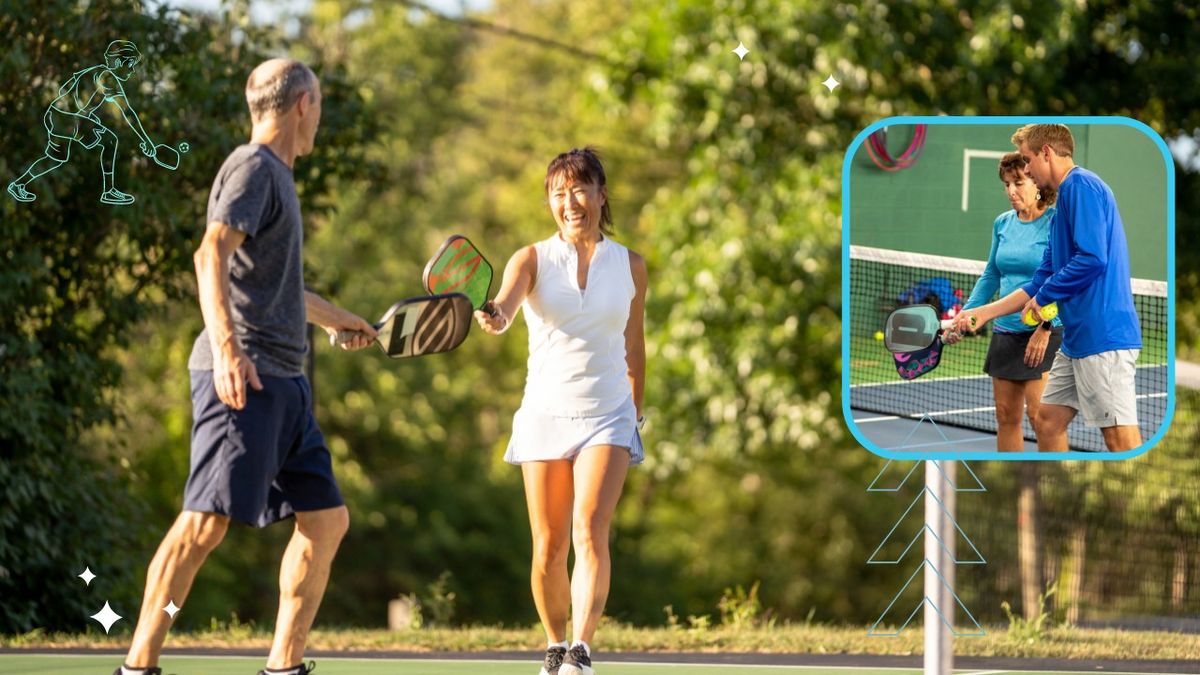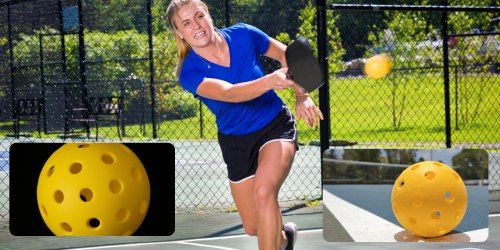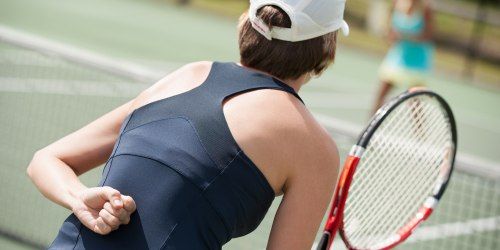How To Get Better At Pickleball?
Want to take your pickleball skills to the next level? Discover the insider secrets and pro-level tips to elevate your game and become a pickleball champion!

Do you find yourself on the pickleball court, enthusiastically swinging your paddle, but feeling like your game could use a little boost?
Are you striving for perfection, our ultimate guide on how to get better at pickleball will have you sharpening your skills faster than you can say "pickle-licious!"
From strategic tips to secret tricks, we've got you covered, so let's serve up some pickleball greatness together! Let's dig in and unlock the path to pickleball mastery. Get ready to score those aces, surprise your opponents, and, of course, have a pickleball load of fun!
So, why wait? Let's get the ball rolling on how to get better at pickleball!
Step 1: Improve Your Basics First
Focus on mastering fundamental techniques such as proper grip, stance, and footwork. Solidifying the basics will form a strong foundation for more advanced skills. Practice regularly and strive for consistency in your shots. Aim to hit the ball cleanly and accurately, minimizing unforced errors during gameplay.
- Court Positioning: Learn how to move effectively on the court, positioning yourself strategically to cover the most ground and anticipate your opponent's shots.
- Serve: A strong and reliable serve can give you a significant advantage in pickleball. Practice different types of serves to keep your opponents guessing.
- Practice with Different Players: Play with opponents of varying skill levels to challenge yourself and adapt to different playing styles. This exposure will enhance your versatility and problem-solving skills.
- Learn: Watch professional pickleball players, attend workshops, or join a local club to learn from experienced players and gain valuable insights.
- Dinking: Mastering the dink shot, a soft and controlled shot close to the net, is crucial for winning points and maintaining control during rallies.
- Physical Fitness: Work on your agility, endurance, and core strength to enhance your performance and reduce the risk of injuries on the court.
- Positive Mindset: Stay optimistic, focused, and mentally resilient during games. A positive attitude can help you overcome challenges and perform at your best.
- Analyze Your Game: Record and review your matches to identify areas of improvement and set specific goals for your pickleball journey. Continuous self-assessment will lead to continuous progress.
Once you are comfortable with the basics, it is time to hone your skills and master your game. Follow these steps on how to get better at pickleball.
Step 2: Mastering Pickleball With Essential Strategies to Elevate Your Game!
As you embark on your journey to master the art of pickleball, you'll undoubtedly acquire various strategies and techniques. However, why settle for mediocrity when you can soar above the competition with a powerful advantage?
In this article, we will delve into five invaluable tips that will propel your progress, elevate your skills, and fast-track your path to becoming a tournament-ready pickleball player in record time! So, let's dive right in and uncover the secrets to supercharging your game.
Master the Art of Precision Placement - While power and speed are essential components of pickleball, precision placement often separates good players from exceptional ones. Hone your ability to place shots with utmost accuracy, aiming for those challenging spots that force opponents into awkward positions. Practice hitting the ball with different angles and spins, strategically targeting the corners of the court, and developing a keen sense of anticipation to predict your rival's moves.

Develop a Versatile Playing Style - Becoming a well-rounded pickleball player is crucial for adaptability on the court. Versatility confuses opponents and keeps them guessing, increasing your chances of dominating the game. Embrace different playing styles, including defensive and offensive strategies, and work on refining your skills in each area. Learn how to shift seamlessly between offense and defense, recognizing when to engage in aggressive attacks and when to adopt a more cautious approach.
Communication and Teamwork Win Matches - Pickleball is not just about individual talent; it's also a team sport. Effective communication with your partner and solid teamwork can turn the tide of a match in your favor. Develop a non-verbal language with your partner to coordinate movements and anticipate each other's actions. A strong partnership creates a formidable force that opponents will find challenging to overcome.

Mental Fortitude - The Game-Changer Pickleball is as much a mental game as it is physical. Developing mental fortitude is essential for maintaining focus, especially during intense and pressure-filled moments. Train your mind to stay calm under stress, overcome mistakes quickly, and maintain a positive attitude throughout the game. Visualize success, set achievable goals, and embrace challenges as opportunities for growth. With a strong and resilient mindset, you'll find yourself dominating matches even against tough opponents.
Analyze and Learn from the Pros - One of the best ways to elevate your game is by studying and learning from professionals. Watch top-level pickleball matches, analyze their strategies, observe their footwork, and pay attention to how they react to different situations. Take notes, study their techniques, and implement what you've learned into your own game. You'll be amazed at how much insight you can gain from the experts and how it translates into improved performance on the court.
Engage with Players at Your Skill Level or Slightly Higher - Finding opponents who are at a similar skill level or slightly above can greatly benefit your pickleball improvement. It challenges you to step up your game and adapt to different playing styles, while also giving you opportunities to showcase your strengths.
Better players help you learn new strategies and techniques while facing opponents of similar skill levels allowing for competitive matches that push you to perform at your best. Additionally, it creates a supportive and motivating environment where everyone can grow and learn together, fostering a sense of camaraderie and enjoyment on the pickleball court.
How To Get Better At Pickleball
FAQs
Q: What is the best way to improve at pickleball?
Q: What 3 skills do you need to be successful in pickleball?
Answer: To be successful in pickleball, three essential skills are crucial:
- Dinking and Soft Shots: Mastering the art of dinking and soft shots is fundamental in pickleball. This delicate touch allows you to control the ball's placement and pace, keeping it low and close to the net. It's a critical skill for both offensive play and defensive strategy.
- Third Shot Drop: The third shot drop is a strategic shot used to regain control of the game after the serve. It involves hitting the ball softly over the net, landing it close to the non-volley zone line. This shot puts pressure on your opponents and helps you gain a better position on the court.
- Volleys: Strong volleying skills are essential in pickleball. Efficient volleys enable you to engage in quick exchanges with your opponents and maintain control of the game at the net. Being proficient in volleys helps you handle fast-paced rallies and seize opportunities to score points.
By honing these three key skills, you'll significantly improve your performance on the pickleball court and elevate your chances of success in matches and tournaments.
Q: How do you hit more power in pickleball?
Answer: To hit more power in pickleball, follow these tips:
- Use Your Body: Generate power from your legs and hips, not just your arm. Bend your knees and use a slight squatting motion to initiate the power transfer. Rotate your hips and shoulders as you swing the paddle to add force to your shot.
- Timing and Contact Point: Focus on the timing and contact point. Hit the ball at the peak of its bounce or slightly in front of your body. This ensures you are hitting the ball at its highest point, maximizing the power you can generate.
- Loose Grip and Snap: Maintain a loose grip on the paddle to allow for a more fluid and natural swing. As you make contact with the ball, snap your wrist slightly to add extra acceleration to the shot.
- Weight Transfer: Shift your weight from back to front during the swing to transfer power from your body to the paddle.
- Follow Through: Finish your swing with a full follow-through, extending your arm and the paddle in the direction of your shot. This will help you maintain control and add more power to your hits.
- Practice: Consistent practice and drills that focus on power shots will help you develop your strength and technique, leading to more powerful hits in pickleball.
Remember that hitting with more power should be balanced with control and accuracy. Don't sacrifice control for power; instead, aim for a balance that allows you to execute powerful shots while keeping the ball in play and placing it where you want it.
Q: What should I eat before pickleball?
Answer: Before playing pickleball, it's essential to fuel your body with the right foods to ensure optimal performance and energy levels. Here are some suggestions for what to eat before playing pickleball:
- Carbohydrates: Prioritize complex carbohydrates like whole grains, fruits, and vegetables. They provide a steady source of energy and help maintain blood sugar levels during the game. Examples include oatmeal, brown rice, quinoa, bananas, and sweet potatoes.
- Protein: Include a moderate amount of lean protein to support muscle repair and maintenance. Good protein sources include chicken, turkey, fish, tofu, beans, and lentils.
- Healthy Fats: Incorporate healthy fats like avocados, nuts, and olive oil. Fats provide a long-lasting energy source and help absorb fat-soluble vitamins.
- Hydration: Drink plenty of water before your pickleball session to stay hydrated. Dehydration can lead to decreased performance and increased risk of injury.
- Timing: Aim to eat a balanced meal 1-2 hours before playing. This allows enough time for digestion, preventing discomfort during the game.
Avoid heavy, greasy, or fried foods that may cause bloating or sluggishness. Additionally, everyone's dietary needs are different, so consider what works best for your body and adjust your pre-game meal accordingly. If you have any specific dietary restrictions or health concerns, consult a nutritionist or healthcare professional for personalized advice.
Q: How do you physically train for pickleball?
Related Questions Worth Reading!
- When Was Pickleball Invented?
- What Pickleball Paddles Do The Pros Use?
- What are the best pickleball paddles?
- How Long Do Pickleball Paddles Last?
- What Are Pickleball Playing Rules?
- What Are The Best Pickleball Paddles?
- What Are Pickleball Court Dimensions
